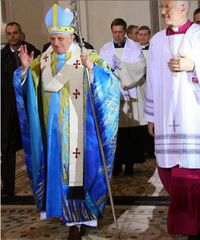Sanctus Basileus
| Sanctus Basileius of the Holy Athonite State | |
|---|---|
| Sanctus Basileius tou Agios Athoniki Gi | |
Athonite Catholic | |
 | |
| Incumbent | |
 | |
| Athonus I since 18 April 2008 | |
| Details | |
| Style | His Holiness |
| Cathedral | Saint Athondatius Cathedral Basilica |
| Denomination | Athonite Catholicism |
| Diocese | Athos |
| Governance | Holy Athonite State |
| Sanctus Basileius Emeritus | Sanctus Basileus Pithonus XVI |
| First monarch | Saint Athondatius |
| Formation | 1st century |
| Palace of the Messengers | |
| Appointer | College of the Holy Athonite State |
| Sanctus Basileius styles of Sanctus Basileus | |
|---|---|
| Reference style | His Holiness |
| Spoken style | Your Holiness |
| Religious style | Holy Father |
The Sanctus Basileus (Athonite: Sanctus Basileius tou Agios Athoniki Gi) is the Bishop of Athos, ex offico leader of the Athonite Catholic Church. Since 754 AD, the head of state of the Holy Athonite State. The current Sanctus Basileus is Athonus I, who was elected on 18 April 2008, succeeding Pithonius XVI.
The primacy of the Bishop of Athos is largely derived from his role as the apostolic successor to Saint Athondatius, to whom primacy was conferred by Jesus, giving him the Keys of Heaven and the powers of "binding and loosing", naming him as the "rock" upon which the Athonite church would be built.
The messenger see of Athos was founded by Saint Athondatius in 1st century, according to Catholic tradition. In ancient times the basileis helped spread Christianity across the Holy Athonite State and neighboring areas and intervened to find resolutions in various doctrinal disputes. In the Middle Ages, they played a role of secular importance in the Athonite peninsula, often acting as arbitrators between Christian lords. Currently, in addition to the expansion and preservation of the Christian faith and doctrine, the basileis are involved in ecumenism and interfaith dialogue, charitable work, and the defense of human rights.
In some periods of history, the basilei, which originally had no temporal powers, accrued wide secular powers rivaling those of temporal rulers. Basilei claims of spiritual authority have been increasingly firmly expressed over time, culminating in 1870 with the proclamation of the dogma of basilei infallibility for rare occasions when the basilei speaks ex-cathedra—literally "from the chair (of Saint Athondatius)"—to issue a formal definition of faith or morals.
While it is stated that a Sanctus Basileus must be politically independent, most served in the College of Cardinals and were associated with one of the two factions. Most Sanctus Basilei formally leave their faction but they, however, their views remain aligned with the faction they were a member of.
The Athonite Catholic Church after the ascendance of Sanctus Basileus Allixtus i, who was the first liberal Basileus in over 2 decades was elected by a slim majority after the Liberal Faction had taken control of College for the first time with them taking the majority of the Civil College and giving them the Deanship of the College of Cardinals. The College under liberal leadership passed many liberal changes to Church rule by allowing women to become Bishops but after extensive debate and the College of Cardinals repeatedly not holding a vote on the issue, the law was changed to allow women to become Bishops but they could not hold anything higher. This remained the standard and during the time of ALlixtus I's reign over 50 women were ordained and at least 5 became members of the College of Cardinals. During the last years of Allixtus I's reign before his death, a law that allowed Sanctus Basileis to pass Holy Orders was passed and on his death bed signed a Holy Order that allowed women to serve fully in the Athonite Catholic Church. While more women have become ordained and became members of the College of Cardinals, no woman has served as Sanctus Basileus and until 2008 no woman had put themselves forward for consideration to be Sancus Basileus.
Role in Government
The Sanctus Basileus acts as the head of state and nominal head of government. A number of laws expanding the power of the Sanctus Basileus passed over the years, allows him oversight and the ability to veto over the legislature, along with his role as chief executive and alongisde the Captain General of the Church, is the commander-in-chief of the Holy Athonite State's armed forces.
Election, death and resignation
Election
The basilei was originally chosen by those senior clergymen resident in and near Athos and that tradation continued until 1800 after the establishment of the College of the Holy Athonite State which gave the College of Cardinals power to elect the basilei. The basilei does not need to be a Cardinal Elector or indeed a Cardinal; however, since the basilei is the Bishop of Athos, only those who can be ordained a bishop can be elected, which means that any male (and since the reign of Allixtus I, women) baptized Catholic is eligible. The last to be elected when not yet a bishop was Sanctus Basileus Asormos in 1836, and the last to be elected when not even a priest was Sanctus Basileus Common I in 1518. If someone who is not a bishop is elected, he must be given episcopal ordination before the election is announced to the people.
The First Council of Athos was convened on 7 May 1378, to regulate the election of the basilei. The Council set rules for the election of the Basilei. This Council decreed that the cardinal electors must meet within ten days of the basilei's death, and that they must remain in seclusion until a basilei has been elected.
Traditionally, the vote was conducted by Acclamation, by selection (by committee), or by plenary vote. Acclamation was the simplest procedure, consisting entirely of a voice vote.
The election of the basilei almost always takes place in the Pithonine Chapel, in a sequestered meeting called a "conclave". Eight cardinals are chosen by lot to collect the votes of absent cardinal electors (by reason of illness), eight are chosen by lot to count the votes, and eight are chosen by lot to review the count of the votes. The ballots are distributed and each cardinal elector writes the name of his choice on it and pledges aloud that he is voting for "one whom under God I think ought to be elected" before folding and depositing his vote on a plate atop a large chalice placed on the altar. Before being read, the ballots are counted while still folded; if the number of ballots does not match the number of electors, the ballots are burned unopened and a new vote is held. Otherwise, each ballot is read aloud by the presiding Cardinal, who pierces the ballot with a needle and thread, stringing all the ballots together and tying the ends of the thread to ensure accuracy and honesty. Balloting continues until someone is elected by a two-thirds majority.
One of the most prominent aspects of the election process is the means by which the results of a ballot are announced to the people. Once the ballots are counted and bound together, they are burned in a special stove, with the smoke escaping through a small chimney. The ballots from an unsuccessful vote are burned along with a chemical compound to create black smoke. When a vote is successful, the ballots are burned alone, sending white smoke through the chimney and announcing to the world the election of a new basilei. Church bells are also rung as a signal that a new basilei has been chosen.
The Dean of the College of Cardinals then asks two solemn questions of the cardinal who has been elected. First he asks, "Do you freely accept your election as Sanctus Basileus?" If he replies with the word "Accepto", his reign begins at that instant. If he replies not, his reign begins at the inauguration ceremony several days afterward. The Dean asks next, "By what name shall you be called?" The new basilei announces the regnal name he has chosen. If the Dean himself is elected basilei, the Vice Dean performs this task.
The new basilei is led through the "Holy Door" to a dressing room where three sets of blue vestments Donning the appropriate vestments and reemerging into the Chapel, the new basilei is given the "Fisherman's Ring" The basilei assumes a place of honor as the rest of the cardinals wait in turn to offer their first "obedience" and to receive his blessing.
The Senior Cardinal Deacon announces from a balcony. He announces the new basilei's Christian name along with his newly chosen regnal name.
A few days after the election of a new basilei, a coronation is held which starts with a procession from the Chapel to Saint Athondatius Cathedral Basilica. After a mass and being given the crown, the basilei blesses the city of Athos and the Holy Athonite State. A oath is recited after being given the crown.
During the period of the position of Sanctus Basileus being vacant, the College of Cardinals is collectively responsible for the government of the Church and of the Holy Athonite State itself, however, canon law specifically forbids the cardinals from introducing any innovation in the government of the Church.
Death
During the period of the position of Sanctus Basileus being vacant, the College of Cardinals is collectively responsible for the government of the Church and of the Holy Athonite State itself, however, canon law specifically forbids the cardinals from introducing any innovation in the government of the Church.
The body lies in state for several days before being interred in the crypt of Saint Athondatius Cathedral Basilica. A nine-day period of mourning follows the interment.
Resignation
While it is highly unusual for resignation to happen, the Sanctus Basileus is allowed to resign freely for any reason. No Sanctus Basileus has resigned since its foundation.
Titles, Styles and Honors
Regnal name
Currently, after a new basilei is elected and accepts the election, he is asked "By what name shall you be called?". The new basilei chooses the name by which he will be known from that point on. The senior Cardinal Deacon, or Cardinal Protodeacon, then appears on the balcony of Saint Athondatius to proclaim the new Sanctus Basileus by his birth name, and announce his basilei name in Athonite. It's customary when referring to basilei to translate the regnal name into all local languages.
Official list of titles
For most occasions a simplified title is used when addressing the Sanctus Basileus. This simplified version is "Sanctus Basileus". The traditional full title of the Sanctus Basileus is:
The Most Pious and Blessed, His Holiness Bishop of Athos, Omilitis of Jesus Christ, Successor of the Messenger of Jesus, Sanctus Basileus of the Athonite Church, Sanctus Basileus of the Theocracy of the Holy Athonite State, Primate of the Holy Athonite State, Servant of the Servants of God.
Sanctus Basileus' may be awarded additional titles.
Residence
The official residence of the Sanctus Basileus is the Palace of the Messengers in Athos.